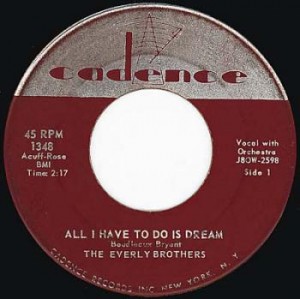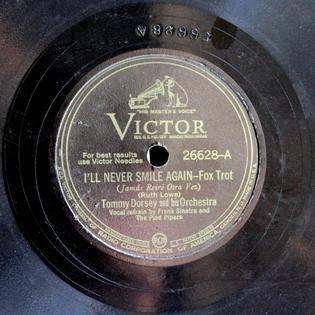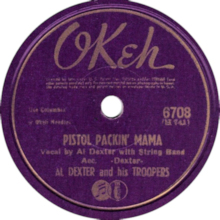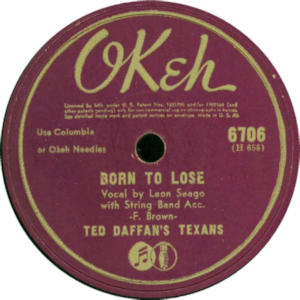Related Research Articles
"You Are My Sunshine" is a song published by Jimmie Davis and Charles Mitchell in 1940. According to Broadcast Music, Inc. (BMI), the song has been recorded by over 350 artists and translated into 30 languages.

"Hey, Good Lookin'" is a 1951 song written and recorded by Hank Williams, and his version was inducted into the Grammy Hall of Fame in 2001. In 2003, CMT voted the Hank Williams version No. 19 on CMT's 100 Greatest Songs of Country Music. Since its original 1951 recording it has been covered by a variety of artists.

"All I Have to Do Is Dream" is a song made famous by the Everly Brothers, written by Boudleaux Bryant of the husband-and-wife songwriting team Felice and Boudleaux Bryant, and published in 1958. The song is ranked No. 141 on the Rolling Stone magazine's list of The 500 Greatest Songs of All Time. The song is in AABA form.
This is a list of notable events in country music that took place in the year 1942.

"The Very Thought of You" is a pop standard that was recorded and published in 1934 with music and lyrics by Ray Noble. The song was first recorded by Ray Noble and His Orchestra with Al Bowlly on vocals for HMV in England in April 1934. This record was then released in the United States by Victor, and it reached number one for five weeks on the pop music charts.

"I'll Never Smile Again" is a 1939 song written by Ruth Lowe. It has been recorded by many other artists since, becoming a standard.
"I Had the Craziest Dream" is a popular song which was published in 1942. The music was written by Harry Warren, the lyrics by Mack Gordon.
"I've Heard That Song Before" is a 1942 American popular song about nostalgia with music by Jule Styne and lyrics by Sammy Cahn. It was introduced by Martha O'Driscoll in the 1942 film Youth on Parade. The song was nominated for the Academy Award for Best Original Song in 1942 but lost out to “White Christmas”.

"Caldonia" is a jump blues song, first recorded in 1945 by Louis Jordan and his Tympany Five. A version by Erskine Hawkins, also in 1945, was described by Billboard magazine as "right rhythmic rock and roll music".
"There! I've Said It Again" is a popular song written and published by Redd Evans and David Mann in 1941. In early 1945, Vaughn Monroe and his Orchestra released Victor 20-1637, which reached the number one position on the Billboard's National Radio Airplay chart for five straight weeks, then no.2 for six more weeks, and a total run of 29 weeks. It finished 1945 as the no. 4 record of the year.

"Pistol Packin' Mama" was a "Hillbilly"-Honky Tonk record released at the height of World War II that became a nationwide sensation, and the first "Country" song to top the Billboard popular music chart. It was written by Al Dexter of Troup, Texas, who recorded it in Los Angeles, California on March 20, 1942, with top session musicians Dick Roberts, Johnny Bond and Dick Reinhart, who all normally worked for Gene Autry).
"Rosalita" is a 1942 song performed by Al Dexter and His Troopers. It was recorded on March 18, 1942 at the CBS Studio at Radio Station KNX, Sunset Blvd., Hollywood, California with session musicians Frank Marvin, Johnny Bond and Dick Reinhart. It was released on Okeh Records #6708 in March 1943, paired with "Pistol Packin' Mama". After the "Most Played Jukebox Folk Records" chart was established on January 8, 1944., it remained for six months, peaking at #1 on March 11, 1944.
"So Long Pal" is a 1944 song by Al Dexter and His Troopers. The song was the follow-up to Al Dexter's two-sided hit, "Pistol Packin' Mama"/"Rosalita". It was recorded on March 18, 1942, along with "Rosalita" and the b-side "Too Late to Worry, Too Blue to Cry". "So Long Pal" stayed at the number one position on the Folk Juke Box chart for thirteen weeks in 1944. The B-side would also hit number one on the same chart.
"Too Late to Worry, Too Blue to Cry" is a 1942 song by Al Dexter. It was recorded on March 18, 1942 at the CBS Studio at Radio Station KNX, Sunset Blvd., Hollywood, California with session musicians Frank Marvin, Johnny Bond and Dick Reinhart. It was released on Okeh records #6718 on February 6, 1944, paired with "So Long Pal". It went to number one on the Folk Juke Box charts for two weeks and stayed on the charts for a total of thirty weeks.
"Among My Souvenirs" is a 1927 song with words by Edgar Leslie and music by Horatio Nicholls.
"Take These Chains from My Heart" is a song by Hank Williams. It was written by Fred Rose and Hy Heath and was recorded at Williams' final recording session on September 23, 1952, in Nashville. The song has been widely praised; Williams' biographer Colin Escott deems it "perhaps the best song [Rose] ever presented to Hank...It was one of the very few songs that sounded somewhat similar to a Hank Williams song." Williams is backed by Tommy Jackson (fiddle), Don Helms, Chet Atkins, Jack Shook, and Floyd "Lightnin'" Chance (bass). In the wake of Williams' death on New Year's Day, 1953, the song shot to No. 1, his final chart-topping hit for MGM Records. Like "Your Cheatin' Heart," the song's theme of despair, so vividly articulated by Williams' typically impassioned singing, reinforced the image of Hank as a tortured, mythic figure.
"Guitar Polka" is a 1946 instrumental song by Al Dexter and His Troopers. "Guitar Polka" spent sixteen weeks at number one on the Juke Box Folk charts and a total of twenty-nine weeks on the chart.
"Wine Women And Song" is a 1940 song written by Al Dexter and Aubrey Gass. It was recorded on April 23, 1940 at Burrus Sawmill Studio, Saginaw, Texas by Al Dexter & His Troopers. It was released June 6, 1940 on Vocalion 05572 with no success. After hits like "Pistol Packin' Mama", Dexter re-recorded it on April 5, 1945 at the CBS Studio at Radio Station KNX, Sunset Blvd., Hollywood, California. It was released on August 15, 1946 on Columbia 37062, backed with "It's Up To You". On September 14, 1946, it reached the no. 1 spot on Billboard's "Most Played Jukebox Folk Records" chart, where it remained for five weeks.
"Honey, Do You Think I'm Wrong" is a country music song written by Al Dexter and Frankie Marvin, performed by Al Dexter and His Troopers, and released on the Columbia label. In February 1946, it reached No. 2 on the folk chart. It spent eight weeks on the charts and was ranked as the No. 12 record in Billboard's year-end folk juke box chart. It was the "B-side" to "Guitar Polka" which peaked at No. 1.

"Born to Lose" is a song written by Ted Daffan. Recorded by his band Ted Daffan's Texans, with vocal by Leon Seago, on February 20, 1942, it was released on shellac in early 1943.
References
- ↑ Library of Congress. Copyright Office. (1942). Catalog of Copyright Entries 1942 1 Music New Series Vol 37 Pt 3. United States Copyright Office. U.S. Govt. Print. Off.
- ↑ Russell, Tony (2004). Country Music Records: A Discography, 1921-1942. New York: Oxford University Press. p. 315. ISBN 0195139895.
- ↑ Whitburn, Joel (2004). The Billboard Book Of Top 40 Country Hits: 1944-2006, Second edition. Record Research. p. 104.